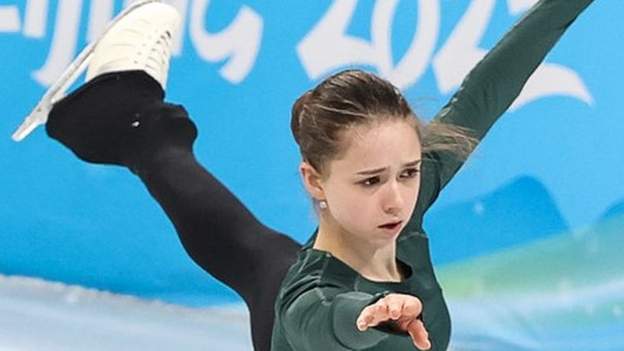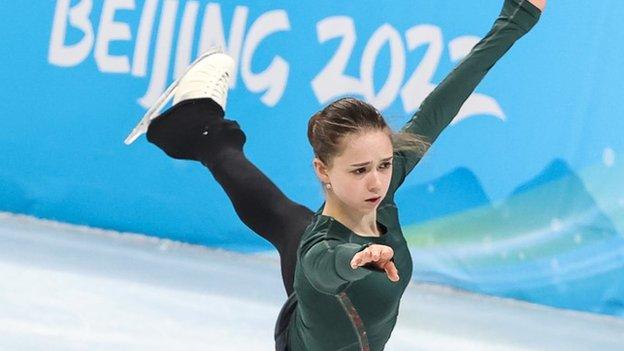

Kamila Valieva, the 15-year-old Russian figure skating star who helped her team win Winter Olympic gold in Beijing, failed a drugs test in December.
Valieva, who was the first female skater to land a quadruple jump at an Olympics as her team won last Monday, had a sample collected on 25 December at the Russian Figure Skating Championships in St Petersburg.
But the positive result was only reported on Tuesday – the day after she helped to win team gold, but before the medal ceremony had taken place.
Valieva tested positive for trimetazidine, which is used in the prevention of angina attacks, but is on the banned list because it is classed as a cardiac metabolic modulator and has been proven to improve physical efficiency.
A series of appeals means this case will now be taken to the Court of Arbitration for Sport (Cas) to make a final ruling – with International Olympic Committee spokesman Mark Adams saying he wanted a resolution “as quickly as possible”.
The medals for the team event – in which the United States finished second, Japan third and Canada fourth – will not be awarded until the outcome of the Cas hearing.
A spokesman for the Russian Olympic Committee (ROC) said it will “take comprehensive measures in order to protect the rights and interests of the members of the ROC team and to preserve the honestly won Olympic gold medal”.
Rusada – the Russian anti-doping agency – said on Friday that it is investigating Valieva’s support team to “identify all the circumstances of a possible anti-doping rule violation”.
Cas will now hear the case before Valieva’s scheduled appearance in the individual women’s figure skating event, which starts next Tuesday, 15 February.
Timeline
The International Testing Agency (ITA) said Valieva had a sample collected on 25 December at the Russian Figure Skating Championships in St Petersburg.
The sample was sent to the World Anti-Doping Agency (Wada)-accredited laboratory in Stockholm, Sweden.
Valieva competed in the European Figure Skating Championships in Tallinn, Estonia, in January – which was between the positive test and the Winter Olympics – and won the women’s singles, with Russian claiming a clean sweep of the gold medals.
The ROC pointed out that Valieva’s samples taken at the Europeans and before the Beijing Winter Olympics were both negative, adding: “Taking into account that the positive doping sample of the athlete was not collected during the Olympic Games, the results of the athlete and the results of the team event during the Olympic Games are not automatically subject to review.”
The adverse finding was reported on 7 February and Valieva was notified of the positive result on 8 February.
Valieva was provisionally suspended but she challenged the decision and the Russian Anti-Doping Agency (Rusada) agreed to lift it on 9 February – enabling her to continue at the Beijing Games.
Because of her age, Valieva was not confirmed as the athlete at the centre of “legal issues” delaying the medal ceremony, until it was widely reported in the media on 10 February. The ITA confirmed those reports on 11 February because of “heightened public interest”.
The International Olympic Committee, Wada and the International Skating Union (ISU) have all now appealed against Rusada’s lifting of the provisional ban, with the ISU calling on the Court of Arbitration for Sport (Cas) to reinstate it.
The ITA said the “reasoned decision, including the grounds for which the provisional suspension was lifted, will be issued shortly to all concerned parties”.
Why the delay?
Russian Olympic Committee president Stanislav Pozdnyakov told the Tass News Agency that the long gap between the 25 December test and the 8 February result looked suspicious and that he had “serious questions about the process”.
Rusada, the Russian anti-doping agency, claimed that the delay in processing Valieva’s sample was due to Covid-19 cases at the Swedish laboratory that was analysing them.
Medallists deserve their moments – reaction
Valieva, who is favourite for the women’s singles, has been seen training at the Capital Indoor Stadium in Beijing.
Eric Myles, chief sport officer of the Canadian Olympic Committee, said: “We have the same questions as everyone else about the team figure skating case.
“It’s important that a fair process unfolds and the integrity of sport is protected. Our hope is that this is resolved quickly and the medallists get the medal moment they’ve earned here in Beijing.”
Russian athletes are competing under the name of the Russian Olympic Committee because Russia received a two-year ban from Wada in 2019 for its state-sponsored doping programme.
Between 17 December 2020 and 17 December 2022, no athlete can represent Russia at the Olympics, Paralympics or World Championships.
The ban was originally for four years but was reduced to two by Cas.
Germany’s Katarina Witt, a two-time Olympic figure skating champion, said: “What they knowingly did to her, if true, cannot be surpassed in inhumanity and makes my athlete’s heart cry infinitely.
“Kamila Valieva is a young girl and child prodigy, whose highly difficult performances and grace enchanted the whole world at only 15, a minor, depending on adults and she is not to blame here.”
United States Anti-Doping Agency head Travis Tygart said: “It is a catastrophic failure of the system to allow the star of the Games to have her sample not reported back close to five weeks, and then it gets reported the day after they won the team event.”
Analysis
BBC senior sports news reporter Laura Scott in Beijing
After days of intense media speculation, the ITA have confirmed that the 15-year-old prodigy Kamila Valieva from Russia tested positive for a banned substance.
Valieva is the favourite for gold in the women’s singles figure skating event which begins on Tuesday (15 February) which means this whole process needs to be expedited.
At the heart of this is a 15-year-old athlete. There are concerns over her welfare and the potential involvement of others in this.
But viewers would be forgiven for feeling a sense of depressing deja vu that once again we are at an Olympics, there is a doping controversy and it involves Russia.
Russia is still serving sanctions, but for many people they are Russia in all but name. Many people will be questioning whether they should have been allowed to compete at all, given the country’s past with doping issues.